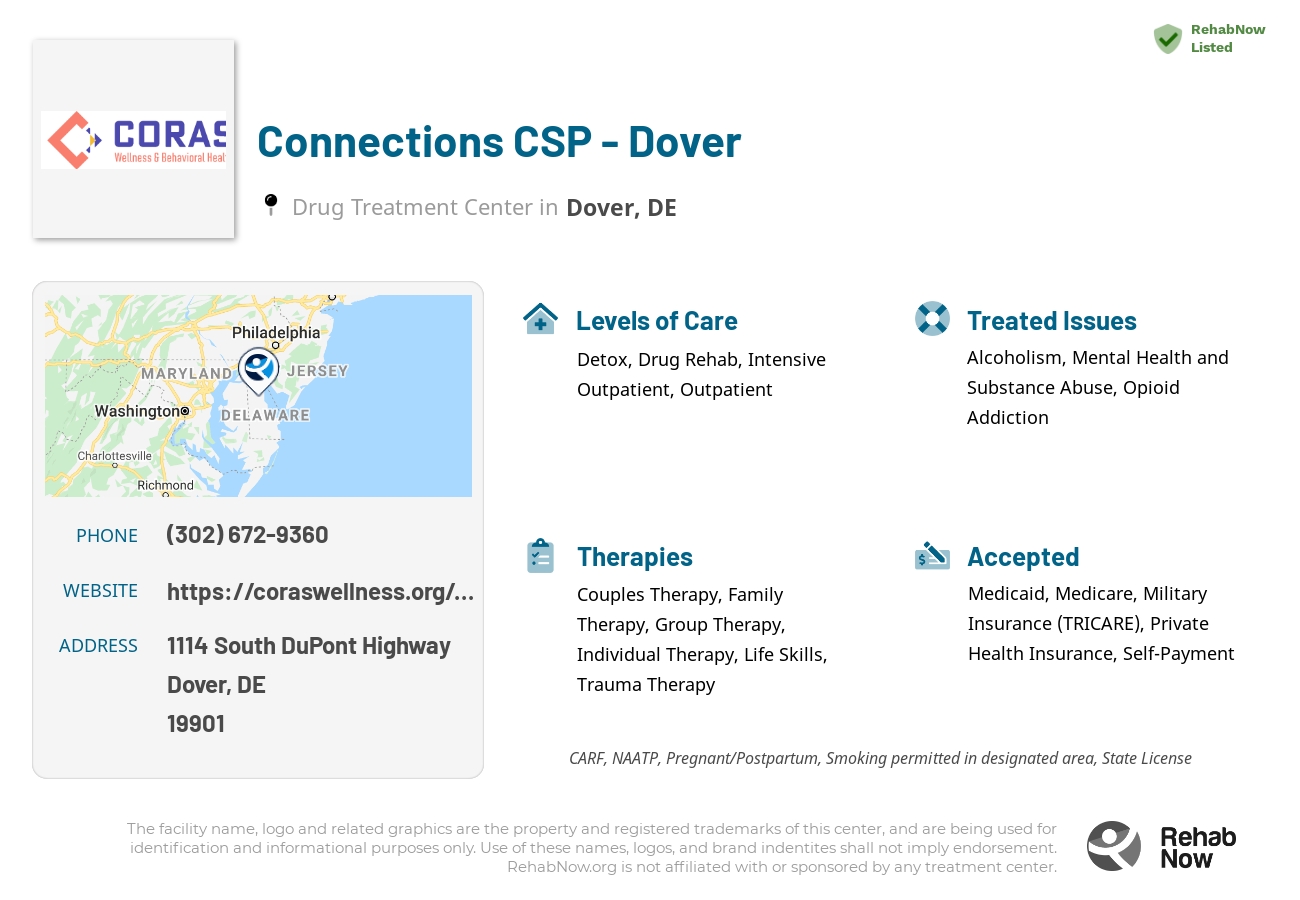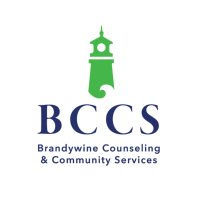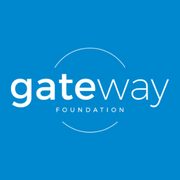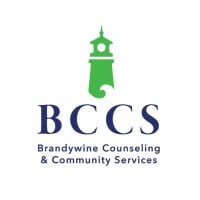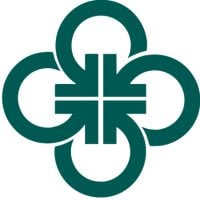Connections CSP - Dover
Drug Rehab Center in Dover, Delaware
Connections CSP - Dover is a comprehensive treatment facility that provides individualized treatment plans and evidence-based treatment options to help individuals struggling with addiction, substance abuse, and mental health disorders; they also offer Continuing Care services to sustain recovery after treatment.
About This Delaware Facility
Connections CSP - Dover is an Addiction Treatment Facility located in Dover, Delaware. While the exact year of its founding is not clear, it has been serving individuals struggling with addiction since at least 2021. Connections CSP - Dover offers a range of services for those suffering from alcoholism, opioid addiction, dual diagnosis, and drug addiction. They provide treatment through various levels of care, including detoxification, drug rehabilitation, intensive outpatient programs, and outpatient programs. This facility accepts private health insurance and is affiliated with CORAS Wellness & Behavioral Health.
Connections CSP - Dover provides comprehensive treatment options for individuals struggling with addiction and substance abuse. Their services are specifically designed to address alcoholism, opioid addiction, dual diagnosis issues, and drug dependency. The facility offers detoxification services to help individuals safely and effectively cleanse their bodies from harmful substances. Through their drug rehabilitation programs, they aim to support clients in achieving long-term recovery by providing them with the necessary tools and therapies to address the underlying causes of their addiction. In addition to inpatient care options, Connections CSP - Dover also offers intensive outpatient programs and outpatient services to accommodate different needs and levels of support required by individuals seeking treatment. Overall, their focus lies on providing tailored treatment plans that promote holistic healing for those battling addiction.
Genders
Ages
Modality
Additional
Conditions and Issues Treated
Many people who struggle with opioid addiction need to attend specific programs like methadone , Suboxone or Vivitrol clinics.
These types of programs will provide the patient with legal, prescription medications that can help them overcome their cravings for illegal opioids like heroin or fentanyl . If the patient has a chronic condition like Hepatitis C, they must undergo treatment before they can begin taking these medications.
Levels of Care Offered at Connections CSP - Dover
This center offers a variety of custom treatment tailored to individual recovery. Currently available are Detox, Drug Rehab, Intensive Outpatient, Outpatient, with additional therapies available as listed below.
An addict may have to go through alcohol or drug withdrawal. While detox may be uncomfortable, it is not life-threatening. Detoxification allows the addict to rid the body of all traces of drugs or alcohol and gives the addict a clean slate for their recovery. In an inpatient or outpatient setting, detox can be managed medically.
Outpatient addiction treatment is beneficial for people who are able to function well in their day-to-day lives. It is recommended for people who are not yet ready to end their relationships with friends or family members who might be encouraging drug and alcohol use.
Intensive outpatient treatment is beneficial for:
- People who are able to attend treatment more than 3 times per week.
- People who do not meet the criteria for inpatient treatment.
- People who are able to contribute to their own recovery outside of the treatment center.
- People who are motivated towards recovery.
- People who are able to overcome addiction on their own without the need for higher levels of care.
Outpatient treatment programs provide drug and alcohol addiction treatment through individual sessions with a counselor, group therapy, 12-step meetings, and other activities to help individuals gain sober living skills. Most programs are designed for those individuals who have completed a medically supervised detoxification program and provide opportunities for clients to begin the process of early recovery.
Outpatient programs also offer a level of medical support as needed and psychological backing through therapy. Clients are encouraged to live at home, though there may be some flexibility regarding this requirement based on the circumstances and needs of each patient.
Outpatient treatment is perhaps the most common type of dual diagnosis program available. It does not pose a significant financial burden on patients. However, it is essential to note that outpatient treatment does not provide the support and supervision given in residential programs. Some addicts may need this level of support to maintain their sobriety.
Therapies & Programs
Therapy sessions focused on the individual addict can provide much-needed guidance as they work toward overcoming their addiction. These types of sessions typically involve guidance from a therapist, who will help addicts identify and process their feelings and cravings.
During these sessions, addicts may develop plans for coping with the triggers that typically lead to relapse and learn how to avoid those triggers during their recovery process.
If you are looking for drug recovery, couples therapy can be a great option. This type of therapy can help rebuild trust and joy in relationships that may have been damaged by addiction. It can also help reduce the dysfunctional behavior in a relationship that may trigger addiction. A patient’s partner will be involved in the process. They can also benefit from therapy, especially if they are trying to live with an addict.
The main goal of family therapy for drug addiction is to create an environment where communication can occur without judgment, hostility, or blame that often occurs within a family.
Family therapy is a type of group problem-solving that aims to improve communication and relationships between the patient, their family, and sometimes friends. The therapist is with the family as they learn to communicate with each other differently, especially with the addict when s/he is using.
The family can learn to reduce their enabling behavior or rally together and support each other during tough times. The patient also learns how to deal with their addiction and maintain sobriety while interacting with the family.
Different types of addiction treatment services are available. Within this article, group therapy is of interest due to its high success rate compared to individual therapy. Group therapy settings are beneficial because they allow recovering addicts to build a strong support network.
Benefits of group therapy are:
- Reduces feelings of isolation
- Immediate access to social support in the form of fellow addicts in recovery
- Lowers risk of relapse
- Increases rate of sobriety
- Builds coping skills that can be applied to everyday life
Trauma Therapy is a form of therapy that involves working with a patient to help them process and understand the past trauma(s) in their life. The idea behind it is that while some people can experience traumatic events and not have lasting psychiatric symptoms, many others will. In these cases, memories of the event get hidden from consciousness but continue to influence how the person processes and copes with things in their life. They may avoid situations that resemble what happened or become suddenly angry or irritated to a situation that reminds them of a past event.
With the help of a therapist, people can go back over memories and experiences. This helps them understand why they are having problems coping with certain situations and how they can change how they think and react to things. This therapy is typically done using techniques such as visualization, discussion, and writing down thoughts and feelings.
Trauma therapists will work with clients to help them understand their past and present relationships. Many times, patients may believe that something is inherently wrong with them or that they are unworthy of love. A therapist aims to correct these negative feelings and behaviors by helping the person realize that their actions do not reflect who they truly are.
One of the main goals of trauma therapy is to help clients express their emotions and talk about what they are feeling. This benefits both to increase awareness of how certain events have impacted them in the past and enables patients to realize that they can make changes in their lives.
Those struggling with addiction in Delaware can benefit from learning certain life skills. It is not as simple as quitting drinking or taking drugs and thinking that the hard part is over. Being sober means living a whole new way of life. Many recovering addicts have found that they need to develop talents like time management, organization, communication skills, socialization skills, and self-esteem to make their life in sobriety work.
Drug and alcohol addiction can lead to a breakdown in life skills. Learning certain life skills can help those who are struggling with addiction. Life skills training at Connections CSP - Dover in Dover, DE teaches patients skills such as time management, budgeting, and social abilities to improve their quality of life and prevent relapse.
An addict’s life skills are maladaptive, meaning they are counterproductive. An addict may have learned poor time management skills growing up, have a hard time budgeting money, or be socially awkward. An addict’s poor life skills can lead to relapse and the inability to achieve long-term sobriety. Life skills training teaches patients effective coping mechanisms, which can help them live a clean and sober life.
Payment Options Accepted
For specific insurance or payment methods please contact us.
Is your insurance accepted?
Ask an expert, call (888) 674-0062
CORAS Wellness & Behavioral Health Associated Centers
Discover treatment facilities under the same provider.
- Connections CSP - Seaford in Seaford, DE
- Connections CSP - Millsboro in Millsboro, DE
- Connections CSP - Newark in Newark, DE
- Connections Community Support Programs - Wilmington in Wilmington, DE
- Connections CSP - Smyrna in Smyrna, DE
Learn More About CORAS Wellness & Behavioral Health Centers
Additional Details
Specifics, location, and helpful extra information.
Dover, Delaware 19901 Phone Number(302) 672-9360 Meta DetailsUpdated November 25, 2023
Staff Verified
Patient Reviews
There are no reviews yet. Be the first one to write one.
Dover, Delaware Addiction Information
The Delaware substance abuse statistics show that the number of deaths due to drug injury is higher than the national average. Over 16% of all deaths in the state between 2008 and 2017 were caused by drugs and alcohol. The state has been rolling out more services to address addiction in an effort to get help to those who need it.
Dover, Delaware has a high rate of drug abuse. Marijuana, heroin, and prescription opioids are the most commonly abused drugs. 12.1% of people over the age of 11 in Dover had an addiction to drugs or alcohol. 12.1% of people over the age of 11 in Dover had an addiction to drugs or alcohol. There are many different types of treatment available in Dover. Such as detox and outpatient treatment.
Treatment in Nearby Cities
- Milford, DE (16.7 mi.)
- Rehoboth Beach, DE (37.7 mi.)
- Laurel, DE (40.6 mi.)
- Millsboro, DE (40.1 mi.)
- Smyrna, DE (11.8 mi.)
Centers near Connections CSP - Dover
The facility name, logo and brand are the property and registered trademarks of Connections CSP - Dover, and are being used for identification and informational purposes only. Use of these names, logos and brands shall not imply endorsement. RehabNow.org is not affiliated with or sponsored by Connections CSP - Dover.


